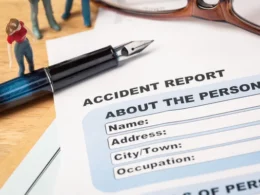If you have suffered a broken shoulder injury due to an accident caused by someone else’s negligence, you may be entitled to compensation. Broken shoulders are common injuries that can occur in car accidents, slip and fall accidents, and other types of accidents.
The severity of a broken shoulder injury can vary widely, from a simple fracture that heals within a few weeks to a more serious injury that requires surgery and months of rehabilitation.
If you are considering filing a broken shoulder injury claim, it is crucial to understand the legal process and what factors can affect the outcome of your case.
Hence, in this detailed and comprehensive guide you will out everything you must know about navigating a broken shoulder injury claim.
Understanding Broken Shoulder Injuries
If you’ve suffered a broken shoulder injury, it can be a painful and debilitating experience. Understanding the common injuries, causes, symptoms, and diagnosis of broken shoulder injuries can help you navigate the process of seeking treatment and compensation.
Common Shoulder Injuries
Shoulder injuries can involve the bones, tendons, ligaments, and joints in and around the shoulder. Common shoulder injuries include fractures of the clavicle (collarbone), proximal humerus (top of the upper arm bone), and scapula (shoulder blade). Soft-tissue injuries such as rotator cuff tears, labral tears, and joint capsule injuries can also occur.
Causes of Broken Shoulder Injuries
Broken shoulder injuries can be caused by a variety of traumatic events, including falls, sports injuries, and motor vehicle accidents. Fractures can also occur due to osteoporosis, a condition that weakens bones and makes them more susceptible to breaking.
Symptoms of Broken Shoulder Injuries
Symptoms of a broken shoulder injury can vary depending on the severity of the injury.
Common symptoms include pain, swelling, bruising, and difficulty moving the arm. In severe cases, there may be disfigurement or an open fracture, which requires immediate medical attention.
Diagnosis of Broken Shoulder Injuries
Diagnosis of a broken shoulder injury typically involves a physical examination, x-rays, and possibly a computed tomography (CT) scan. Soft-tissue injuries may require magnetic resonance imaging (MRI) to diagnose.
Treatment for broken shoulder injuries can involve immobilization in a sling or surgery, depending on the severity of the injury.
In some cases, clavicle fractures may be treated with plates and screws, while proximal humerus fractures may require open reduction and internal fixation.
Understanding the common injuries, causes, symptoms, and diagnosis of broken shoulder injuries can help you take the necessary steps to seek treatment and compensation.
If you’ve suffered a broken shoulder injury due to someone else’s negligence, it’s important to consult with a personal injury attorney to understand your legal options.
Medical Treatment for Broken Shoulder Injuries
If you have suffered a broken shoulder injury, it is essential to seek medical attention immediately. Medical treatment for broken shoulder injuries can vary depending on the severity of the injury. In this section, we will discuss the different types of medical treatment available for broken shoulder injuries.
Surgery for Broken Shoulder Injuries
Surgery may be necessary for severe shoulder injuries, such as fractures involving the shoulder joint or scapula. During surgery, the broken bones will be realigned and held together with plates, screws, or pins. In some cases, a shoulder replacement may be necessary. Surgery for broken shoulder injuries can be invasive and may lead to higher medical bills.
Non-Surgical Treatment for Broken Shoulder Injuries
Most non-displaced fractures require immobilization in a sling until the fracture heals enough to be comfortable and permit motion without risk of dislodging the fracture fragments. X-rays are used to determine if sufficient healing has occurred to permit motion exercises.
Treatment involves immobilization with a sling or shoulder immobilizer, icing, and pain medications. Minor shoulder sprains or strains typically heal with little or no medical intervention.
Physical Therapy for Broken Shoulder Injuries
Physical therapy is an essential part of the recovery process for broken shoulder injuries. Physical therapy can help restore range of motion, strength, and flexibility to the shoulder joint. It can also help prevent future injuries and improve overall shoulder function.
Occupational Therapy for Broken Shoulder Injuries
Occupational therapy can help individuals with broken shoulder injuries regain their ability to perform daily activities, such as dressing, grooming, and eating. Occupational therapy can also help individuals return to work and other activities.
In addition to medical treatment, individuals with broken shoulder injuries may also experience pain and suffering, emotional distress, and future medical care.
Economic damages, such as lost income, past lost income, future lost income, and loss of earning capacity, may also be a factor in a broken shoulder injury claim.
Soft tissue injuries, such as ligaments and tears, and rotator cuff tears may also be present in a broken shoulder injury.
It is essential to speak with an experienced personal injury attorney to understand your legal rights and options if you have suffered a broken shoulder injury.
Aknowledgeable attorney can help you navigate the legal process and ensure that you receive the compensation you deserve.
Filing a Broken Shoulder Injury Claim
If you have suffered a broken shoulder injury due to someone else’s negligence, you may be entitled to compensation. Filing a personal injury claim can help you recover damages for medical expenses, lost wages, pain and suffering, and other losses related to your injury.
Understanding Personal Injury Claims
A personal injury claim is a legal action taken by an injured person to seek compensation from the at-fault party.
To file a personal injury claim for a broken shoulder injury, you will need to prove that the other party was negligent and that their negligence caused your injury.
Negligence can include actions such as failing to maintain safe premises, failing to provide adequate safety equipment, or failing to warn of potential hazards.
Dealing with Insurance Companies
In most cases, you will be dealing with the at-fault party’s insurance company when filing a personal injury claim.
Insurance adjusters will often try to minimize the amount of compensation they pay out, so it is essential to be prepared.
Be sure to document your injury and any medical treatment you receive. It is also a good idea to consult with a personal injury attorney who can help you navigate the claims process and negotiate with the insurance company on your behalf.
Calculating Damages
Calculating damages for a broken shoulder injury can be complex. In addition to medical expenses and lost wages, you may be entitled to compensation for severe pain, permanent disability, loss of enjoyment of life, and limited movement.
It is vital to keep track of all expenses related to your injury and to consult with a personal injury attorney who can help you calculate the full extent of your damages.
Negotiating a Settlement
Once you have calculated your damages, you will need to negotiate a settlement with the at-fault party’s insurance company. This can be a complex process, and it is essential to have an experienced personal injury attorney on your side.
Your attorney can help you negotiate a fair settlement that fully compensates you for your losses.
In conclusion, filing a broken shoulder injury claim can be a complex process, but with the help of an experienced personal injury attorney, you can recover the compensation you deserve.
Be sure to document your injury and any medical treatment you receive, calculate your damages carefully, and negotiate a fair settlement with the insurance company.
Hiring a Personal Injury Lawyer for A Broken Shoulder Injury Claim
If you’ve suffered a broken shoulder injury due to an accident, you may be entitled to compensation. However, navigating the legal system and dealing with insurance companies can be complex and overwhelming.
That’s where a personal injury lawyer comes in. In this section, we’ll discuss when to hire a personal injury lawyer, the benefits of hiring one, and how to choose the right lawyer for your case.
When to Hire a Personal Injury Lawyer
If you’ve suffered a broken shoulder injury due to the negligence of another party, you may be entitled to compensation for your medical bills, lost wages, and pain and suffering.
However, it can be challenging to determine the value of your claim and negotiate with insurance companies on your own. That’s why it’s crucial to hire a personal injury lawyer who has experience handling cases like yours.
You should consider hiring a personal injury lawyer if:
- You suffered a broken shoulder injury at work and need to file a workers’ compensation claim.
- Your broken shoulder injury was caused by lifting heavy objects.
- Your broken shoulder injury was caused by a slip-and-fall accident
- Your broken shoulder injury was caused by a car accident.
Benefits of Hiring a Personal Injury Lawyer
Hiring a personal injury lawyer can provide several benefits, including:
- Legal expertise: Personal injury lawyers have a deep understanding of the legal system and can help you navigate the complex process of filing a claim.
- Negotiation skills: Personal injury lawyers are skilled negotiators and can help you get the compensation you deserve.
- Full recovery: A personal injury lawyer can help you get the medical treatment you need to make a full recovery.
- Chronic pain and weakness: If you’re experiencing chronic pain or weakness as a result of your broken shoulder injury, a personal injury lawyer can help you get compensation for ongoing medical treatment.
Choosing the Right Personal Injury Lawyer
When choosing a personal injury lawyer, it’s important to find someone who has experience handling cases like yours. You should also look for a lawyer who:
- Offers a free consultation.
- Works on a contingency fee basis.
- Has a good track record of success
- Communicates clearly and regularly with clients.
By hiring the right personal injury lawyer, you can increase your chances of getting the compensation you deserve for your broken shoulder injury.
YOU SHOULD ALSO READ:
- Road Traffic Personal Injury Claims: A Comprehensive Guide
- Can You Get Legal Aid for Personal Injury Claims? Explained
- Personal Injury Claim Medical Examination: What to Expect and How to Prepare
- Personal Injury Claim: What You Need to Know About Broken Ankle Cases
- Personal Injury vs. Medical Negligence: Understanding the Key Differences












